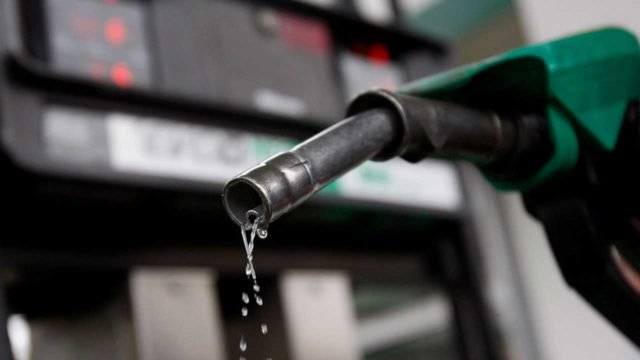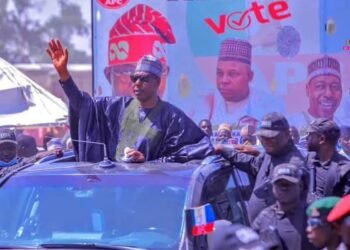The people of Borno, Yobe and Adamawa have expressed shock and disappointment over the increase in the pump price of Premium Motor Spirit (PMS) by the NNPC Retail Management.
The News Agency of Nigeria (NAN) reports that NNPC Retail Management had on Tuesday approved upward review of the pump price from N617 per litre to N897 llitre, effective from Sept. 3.
This is amid economic hardship and persistent fuel scarcity.
Checks by NAN revealed that the NNPC retail stations immediately adjusted their pumps and totems (price boards), reflecting the new PMS price of N897 as against N617 per lite.
Many residents in Maiduguri, Yola and Damaturu, who spoke to NAN said that it was more worrisome that the product was not even available at the cost of N897, forcing them to buy a litre from black market for between N1, 000 and above.
In Maiduguri, most filling stations have no fuel, while the few with fuel are selling from N1,100 and above leading to increase intransport fare by about 30 per cent.
However, Borno Government mass transit taxis and buses are still conveying passengers within Maiduguri at the old prices of N100 per drop for taxis and N50 for buses.
Yakubu Baba, a civil servant said it was unfortunate and insensitive that the increase was coming when the government was yet to implement the new minimum wage.
“Its sad we continue to experience a series of increases in prices of things in spite of the non implementation of minimum wage by the Federal and most state governments.
“Such development look more like punishment for workers and other Nigerians.”
In Yola, the capital of Adamawa where the commodity sells for between N1,100 and N1,200 per litre, transport fares have been increased by 30 per cent.
The residents condemned the increase, and called for a reversal.
Malam Buba Ali, a driver, said the situation had paralysed both intra and inter states transportation in the state.
According to Ali, it has made transport business to be more of survival than profit.
“Our fear now is that prices of spare parts and other commodities will increase,” he said.
Dahiru Buba, the Adamawa Chairman of Independent Marketers Association of Nigeria (IPMAN), also condemned the increase which he said could push some of his members out of business.
In Damaturu, the capital of Yobe, residents said already there was fuel scarcity in the state which was worsened by the hike.
Alhaji Baba Dan’Iya, a businessman, described the increase as a “double blow” to the already struggling economy and pockets of many Nigerians.
“We are still grappling with the aftermath of insurgency in the state, and now this fuel hike, which is further exacerbating our challenges,” he lamented.
Malam Bukar Modu, a commercial driver, said the hike had significantly increased his operational costs.
“The increase in fuel prices has forced us to raise transportation fares, which has affected our customers,” he said.
Alhaji Faruq Mamman, a farmer, expressed fears that the hike would lead to a surge in the prices of agricultural inputs and food items.
“Farmers rely heavily on transportation to transport their produce to markets. With the increase in fuel prices, we anticipate a corresponding rise in the cost of food,” he said.
Mr Suleiman Sani, a civil servant, advised the government to rethink and address the hardship caused by the fuel hike.
“We understand the economic challenges facing the country, but the burden should not be borne solely by the common man,” he said.
NAN reports that most filling stations in Damaturu remained closed due to the scarcity of fuel.
The few stations that opened were selling the product at exorbitant prices, ranging from N1, 450 to N1, 500 per litre. (NAN)










